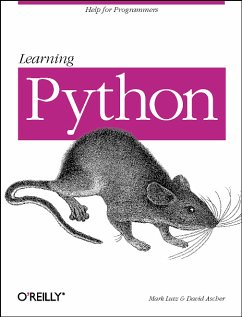Learning Python is an introduction to the increasingly popular Python programming language. Python is an interpreted, interactive, object-oriented scripting language. Python is growing in popularity because:
* It is available on all important platforms: Windows NT, Windows 95, Windows 98, Linux, all major UNIX platforms, MacOS, and even the BeOS.
* It is open-source software, copyrighted but freely available for use, even in commercial applications.
* Its clean object-oriented interface makes it a valuable prototyping tool for C++ programmers.
* It works well with all popular windowing toolkits, including MFC, Tk, Mac, X11, and Motif.
Learning Python is written by Mark Lutz, author of
Programming Python and Python Pocket Reference; and David Ascher, a vision scientist and Python user.
This book starts with a thorough introduction to the elements of Python: types, operators, statements, classes, functions, modules, and exceptions. By reading the first part of the book, the reader will be able to understand and construct programs in the Python language. In the second part of the book, the authors present more advanced information, demonstrating how Python performs common tasks and presenting real applications and the libraries available for those applications.
All the examples use the Python interpreter, so the reader can type them in and get instant feedback. Each chapter ends with a series of exercises. Solutions to the exercises are in an appendix.
Learning Python is an introduction to the increasingly popular Python programming language. Python is an interpreted, interactive, object-oriented scripting language. Python is growing in popularity because:
* It is available on all important platforms: Windows NT, Windows 95, Windows 98, Linux, all major UNIX platforms, MacOS, and even the BeOS.
* It is open-source software, copyrighted but freely available for use, even in commercial applications.
* Its clean object-oriented interface makes it a valuable prototyping tool for C++ programmers.
* It works well with all popular windowing toolkits, including MFC, Tk, Mac, X11, and Motif.
Learning Python is written by Mark Lutz, author of
Programming Python and Python Pocket Reference; and David Ascher, a vision scientist and Python user.
This book starts with a thorough introduction to the elements of Python: types, operators, statements, classes, functions, modules, and exceptions. By reading the first part of the book, the reader will be able to understand and construct programs in the Python language. In the second part of the book, the authors present more advanced information, demonstrating how Python performs common tasks and presenting real applications and the libraries available for those applications.
All the examples use the Python interpreter, so the reader can type them in and get instant feedback. Each chapter ends with a series of exercises. Solutions to the exercises are in an appendix.
* It is available on all important platforms: Windows NT, Windows 95, Windows 98, Linux, all major UNIX platforms, MacOS, and even the BeOS.
* It is open-source software, copyrighted but freely available for use, even in commercial applications.
* Its clean object-oriented interface makes it a valuable prototyping tool for C++ programmers.
* It works well with all popular windowing toolkits, including MFC, Tk, Mac, X11, and Motif.
Learning Python is written by Mark Lutz, author of
Programming Python and Python Pocket Reference; and David Ascher, a vision scientist and Python user.
This book starts with a thorough introduction to the elements of Python: types, operators, statements, classes, functions, modules, and exceptions. By reading the first part of the book, the reader will be able to understand and construct programs in the Python language. In the second part of the book, the authors present more advanced information, demonstrating how Python performs common tasks and presenting real applications and the libraries available for those applications.
All the examples use the Python interpreter, so the reader can type them in and get instant feedback. Each chapter ends with a series of exercises. Solutions to the exercises are in an appendix.
Learning Python is an introduction to the increasingly popular Python programming language. Python is an interpreted, interactive, object-oriented scripting language. Python is growing in popularity because:
* It is available on all important platforms: Windows NT, Windows 95, Windows 98, Linux, all major UNIX platforms, MacOS, and even the BeOS.
* It is open-source software, copyrighted but freely available for use, even in commercial applications.
* Its clean object-oriented interface makes it a valuable prototyping tool for C++ programmers.
* It works well with all popular windowing toolkits, including MFC, Tk, Mac, X11, and Motif.
Learning Python is written by Mark Lutz, author of
Programming Python and Python Pocket Reference; and David Ascher, a vision scientist and Python user.
This book starts with a thorough introduction to the elements of Python: types, operators, statements, classes, functions, modules, and exceptions. By reading the first part of the book, the reader will be able to understand and construct programs in the Python language. In the second part of the book, the authors present more advanced information, demonstrating how Python performs common tasks and presenting real applications and the libraries available for those applications.
All the examples use the Python interpreter, so the reader can type them in and get instant feedback. Each chapter ends with a series of exercises. Solutions to the exercises are in an appendix.

